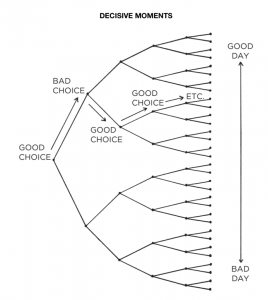James Clear’s first three laws of behavior change—make it obvious, make it attractive, and make it easy—increase the odds that a behavior will be performed this time. The fourth law of behavior change—make it satisfying—increases the odds that a behavior will be repeated next time. It completes the habit loop. Clear’s fourth law is, “What is immediately rewarded is repeated. What is immediately punished is avoided.”
And here’s where we run into a major problem, because most good habits come with an immediate cost or loss, whereas most bad habits come with an immediate reward or gain. Bad habits have an immediate reward and long-term costs (e.g. eating lots of chocolate), whereas good habits have an immediate cost but long term reward (e.g. dieting).
Indeed, success in nearly every field requires is to ignore an immediate reward in favor of a delayed reward. That’s why, “People who are better at delaying gratification have higher SAT scores, lower levels of substance abuse, lower likelihood of obesity, better responses to stress, and superior social skills.”
So, what do we do? How do we use Clear’s fourth law? We can ignore it and simply push on through the immediate pain in hope of perseverance until we get the long-term gain. We can do this in the strength of God, relying on the power of the Holy Spirit to sustain, support, and strengthen us through the pain until repentance and obedience does pay off in the long-term. We can trust God’s promises of blessing upon obedience and tough it out by his grace. That’s certainly an option, and sometimes it’s the only option.
However, at least in some cases, might we not incorporate Clear’s suggestion to help us wait for ultimate gratification: “Add a little bit of immediate pleasure to the habits that pay off in the long-run and a little bit of immediate pain to ones that don’t.”
“Heresy!” you charge. “Is the Holy Spirit not enough?” Do we need to add Habit science to the Holy Spirit?
Well, consider a couple of immediate pleasures and immediate pains that Clear has in mind (you can think up others I’m sure):
Immediate reward: A habit tracker that provides visible evidence of success and progress.
Immediate punishment: An accountability partner or a habit contract that adds a social cost to bad behavior.
Obviously, these means could be, and often are, used independently of the Holy Spirit. But acknowledging that some of us need all the help we can get, is it not possible that the Holy Spirit can use these immediate rewards and punishments to help us to change out habits for the better? can we not pray:
“Lord I’m weak. I wish I could do what’s right just because it’s right. But often I don’t. I wish I could do what’s right because the Bible says it will pay off at the end. But I confess, even that ideal doesn’t change me. I’m weak and my ideals don’t match my reality. So, please see my desire to change. But also see my weakness. And bless my habit tracking and accountability to provide immediate reward for good and immediate punishment for wrong, and so make long-term changes in my life and character. Glorify your name as I look to you to do what I cannot do. And all for Jesus sake. Amen.”
See more Atomic Habits posts here.
Atomic Habits: An Easy & Proven Way to Build Good Habits & Break Bad Ones







